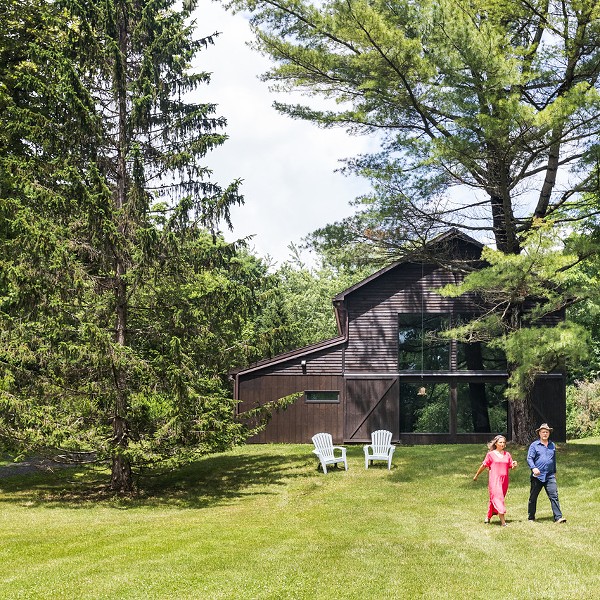and your belly by my need
perhaps i can go on
—p
Unfair to Apes
An animal named Tommy called me on the phone screaming that I ordered a storm window for the closet. I did not order a storm window. I told him to get me a price on a storm window that I would order only if it was cheap enough since I could get the handyman who was anyway building me a shelf in the bedroom to just nail a board or something over the window so the cold air wouldn’t blow in whenever I opened the closet door. Whoever heard of a window in a closet? But that’s beside the point. The point is that Tommy acted like an animal and I use the word “animal” loosely because I know I am using it in a context that is unfair to animals which I, in general, like—though I didn’t like the squirrel that tore apart my favorite succulent and for what? Bugs to eat? If Tommy had been a little guy, perhaps him screaming at me wouldn’t have been as horrifying as it was, but imagining this muscle-bound ape coming at me through the phone, as though he could squeeze his square body through the instrument, was even scarier to me than the night a year ago when I heard a terrific crash outside my house and imagined kids throwing rocks from a passing car or a big bird like a buzzard falling dead against my front door; imaginings that frightened me less than my discovery next morning that the large planter on my porch had been smashed to bits by a black bear, an animal even stronger and scarier than Tommy.
—Roberta Allen
Mortar
He came home to find
the front door of his house
bricked solid
the mortar
smelled like wet grout
the dental hygienist
puts in your mouth
it hardens
wants to cling to you
when she chivvies it out
the bricks were an
illusion
the door opened like
a mouth and he walked through
nothing had changed
the TV
his wife and two friends
he didn’t want to fuck
he wondered had
he ever
he couldn’t recall
he felt as though enzymes
permeated
his eyes he
began to soften
—Tad Richards
Would We?
After the sun set
and we tired of playing
hide and go seek, I followed
you into the barn where you grabbed
the flashlight, then ran through the cool grass
flashing flickers of light with the fireflies, climbed
the stairs high into your brothers old tree house, where
you searched for those hiding pictures you knew were there.
stiff mildew polaroids under yellowed papers and comic books
And when you found them we marveled, wondering about our own
someday, when we would grow breasts and hair on our bodies...
Would we strip for would-be boyfriends with cameras?
—B law
Home Office
She used to spend her days in offices,
one of the early ones circling the coffee room—
smile not yet erased by daily memos,
interoffice mail, the supervisor’s
peremptory smirk—her dress not creased
by the uneasy seat of her creeping
clerical chair. These mornings became her
constants regular—lifeless as the news.
Now she comes alone to daylight, brews
her own drink, taking care not to make more
than she can consume, careful not to waste.
She works at her own pace, but she’ll tell
you truth—she liked the little frisson she felt
when someone brushed by, hand brushing her rear.
—Bertha Rogers
Forlorn Turtle Verse
I would have cherished the excursion you suggested
Into well-explored wilds
In hunt of elusive poem
For your much-beloved turtles;
Yet the distance between suggestion
And
implementation
Proved too much
As you proceeded at a turtle’s pace,
Attention waning,
Invite stalled,
And I regretfully discovered on my own
Some other author’s chelonian verse,
Written with more authority
Than fate will now allow me to muster.
—Oliver Olive-Eyes Grech
On Being Idle and Blessed: HER
The view is of rolling verdant hills, the mountains beyond, purple and blue in their distance. The walls of the house are glass. Outside comes inside every day.
The birds chitter away, teaching their young to fledge. A feral cat lurks in the tall crownvetch, crouched low and eager to pounce on a tumbling bird. His ears come to devilish points, and long fur extends from his jowels...looking more like a lynx than a barncat. His eyes meet mine briefly, and though mine linger, his have more important things to do. Surely the birds know he is there?
So glorious, the soul takes in the scenery as easily as the eyes, lapping it up, like a cat with milk; feeding the senses, warming the heart, intoxicating the brain.
Thud! A bird has flown into the window on the other side of the house. A cloudy smudge marks where it made impact. He is down for the count, on the grass below. She takes a small brown paper bag and some garden gloves to protect her hands and places the stunned bird in the bag. Closing it, she sits on the ground, the bag in her lap.
What a delightful gift, she thinks, waiting patiently for the fluttering she anticipates. But the bird remains still, like her heart. She opens the bag and, inside, the bird looks up at her with one upturned eye. She reaches in and cups him in the palms of her hands. Cocking his head, he looks up at her now with the other eye.
She walks him past the various birdhouses on the property. He remains docile. Is he interested? Unable to decide? Then, a bird warbles from a distant tree. And, off he goes.
—Carol Lee
On Being Idle and Blessed: HIM
The leaves overhead were unfurling from their buds, like butterflies from their cocoons. The air was damp, warm and dense, with only a thin curtain of fog.
The sun was just past overhead and he made it about one o’clock. He might have earlier been splitting wood, a chore more associated with October, but he enjoyed the work and did it whenever the branches could hold on no longer; like these casualties of winter.
He enjoyed it until he didn’t. Perhaps the wedge was now permanently lodged inside a log. Or, maybe he couldn’t find where he had last tossed it in a mass of leaves. Maybe the axe handle had broken, or he strained a muscle in his back. Then he’d thunder at the gods, hurling expletives. Sometimes, he just got tired of it, or even finished chopping all of it. Either way, he’d wend his way to nirvana.
He had his “spot.” Here he could laze through the seasons adoring the world overhead as the mantle morphed from a pattern of lofty bare branches on a slate background, into the outrageous cacophony of rustling leaves on a breezy day. Perhaps his favorite time was when the great maple turned yellow in the fall, the leaves lush, loud and bouncing off a seamless blue sky.
He’d get lost in it, his mind traveling to places he’d never otherwise go. Here there were no reservations, to make or to have. The hammock was a kind of magic carpet, fueled by the beauty of the canopy overhead.
A fawn approaches. His wobbly legs place him near birth, as does his proximity to man. A twin follows close behind. They stare at him, coursing through the galaxies in his hammock. “What are you doing here?” they appear to be saying.
—Carol Lee
Heidegger Becoming Round, da Mtn
if you begin making
a great spring roll
and end up with
a great chocolate almond croissant,
your intention must have
changed along the way.
the Divine is not
a priori,
but emerges
with us
like dawn washing down Roundtop again.
—Mark Vian
At Harvest’s End
The rain showers slipped south of Jaguar Paw.
Papa Sun drew back burnt-orange blankets of warmth
to the chin of the isolated village.
Shukar, the youngest Zamboozie, plucked sweet from
the bruised branches of a shrunken banana tree. Mother
Sheilamae bent a bamboo bow on top her knee, and shot three
gold-tip arrows at the highest arch-point of the newlyformed rainbow.
Joy for this good harvest, she shouted in native tongue. Shalamesh,
nearing a ripe age, devoted his praiseful attention to
Shunanny, the long-necked girl,
bathing nude in the river.
—Zachary C. Bush
The Walk Home
The sky is running towards me running towards it
across the slick and blackened pavement
And shouting just to get through to keep going up
the crick the rain has made of college walk
And all across New York the rain is driving
people in their hordes under the street
And itself from eardrum down to spine and further—
Listen,
I’m not the only one.
The plazas flock with hurt umbrellas.
One skipped behind me
as my own umbrella tore,
Running from the wind
while
I face to it, shouting
I love it. Yes I love it. More.
—Reina Hardy

















